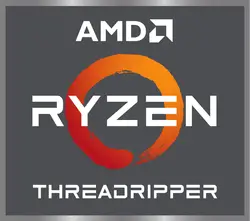| AMD Ryzen Threadripper | |

| |
| Developer | AMD |
| Manufacturer | GlobalFoundries, TSMC |
| Type | Microprocessors |
| Introduction | May 16, 2017 (announced) August 10, 2017 (launch) |
| Architecture | high-performance x86 processors |
| ISA | x86-64 |
| µarch | Zen, Zen+, Zen 2 |
| Word size | 64 bit 8 octets
16 nibbles |
| Process | 14 nm 0.014 μm , 12 nm1.4e-5 mm 0.012 μm , 7 nm1.2e-5 mm 0.007 μm
7.0e-6 mm |
| Technology | CMOS |
| Clock | 3,000 MHz-3,800 MHz |
| Package | FCLGA-4094 |
| Socket | Socket TR4, Socket TRX4 |
| Succession | |
| ← | |
| FX | |
Ryzen Threadripper (pronounced Rye-Zen Thread-ripper) is a family of 64-bit x86 enthusiasts/high-performance desktop microprocessors. Ryzen Threadripper is geared toward prosumers that rely on heavily threaded applications and multitasking.
Contents
Overview
Ryzen Threadripper is a family of high core count x86 microprocessors. Threadripper is geared toward mainstream users who rely on heavily threaded applications and multitasking beyond what the Ryzen 7 processors can provide.
While Threadripper uses the same dies as the ones used for Ryzen, their performance characteristics are a little different. Since every die has a slightly different performance characteristics, even from within the same wafer, AMD sorts those dies based on this performance. The top 5% Ryzen dies are then used for the Threadripper models. Higher-performance dies allow for higher efficiency in terms of power consumption at higher clock speeds and in theory allow for higher overclocking overhead.
Codenames
| Introduction | Codename | Microarchitecture | Socket | Process | Cores |
|---|---|---|---|---|---|
| August, 2017 | Whitehaven | Zen | sTR4 | 14 nm (14LPP) | 8-16 |
| August, 2018 | Colfax | Zen+ | sTR4 | 12 nm (12LP) | 12-32 |
| November, 2019 | Castle Peak (CPK) | Zen 2 | sTRX4 | 7 nm (N7) | 24-64 |
| 2020/21 | Genesis Peak | Zen 3 | ? | 7 nm (N7+) | ?-? |
Models
1900-Series (Zen)
- See also: Zen µarch and Codename Whitehaven
Announced in May 2017 and introduced in July of 2017, first-generation Threadripper is based on the Zen microarchitecture and is manufactured on GF's 14 nm process.
All models have
- Memory controller: Quad-channel, up to 512 GiB per channel (2 TiB in total)
- I/O: 60 PCIe 3.0 lanes (x48 lanes for multiple GPUs, x12 for I/O)
- TDP: 125 W / 155 W / 180 W
- ISA: Everything up to AVX2 (i.e., SMM, FPU, NX, MMX, SSE, SSE2, SSE3, SSSE3, SSE4.1, SSE4.2, AES, AVX, FMA3, and AVX2), and SHA
- Tech: AMD-V/Vi, Precision Boost, SMEP, 2-way SMT, XFR (+200 MHz)
- L3$: 16 / 32 MiB
| List of 1st-Generation Threadripper Processors | |||||||||
|---|---|---|---|---|---|---|---|---|---|
| Model | Price | Launched | Cores | Threads | TDP | L2$ | L3$ | Base | Turbo |
| 1900X | $ 549.00 € 494.10 £ 444.69 ¥ 56,728.17 | 31 August 2017 | 8 | 16 | 180 W 180,000 mW 0.241 hp 0.18 kW | 4 MiB 4,096 KiB 4,194,304 B 0.00391 GiB | 16 MiB 16,384 KiB 16,777,216 B 0.0156 GiB | 3.8 GHz 3,800 MHz 3,800,000 kHz | 4 GHz 4,000 MHz 4,000,000 kHz |
| 1920X | $ 799.00 € 719.10 £ 647.19 ¥ 82,560.67 | 10 August 2017 | 12 | 24 | 180 W 180,000 mW 0.241 hp 0.18 kW | 6 MiB 6,144 KiB 6,291,456 B 0.00586 GiB | 32 MiB 32,768 KiB 33,554,432 B 0.0313 GiB | 3.5 GHz 3,500 MHz 3,500,000 kHz | 4 GHz 4,000 MHz 4,000,000 kHz |
| 1950X | $ 999.00 € 899.10 £ 809.19 ¥ 103,226.67 | 10 August 2017 | 16 | 32 | 180 W 180,000 mW 0.241 hp 0.18 kW | 8 MiB 8,192 KiB 8,388,608 B 0.00781 GiB | 32 MiB 32,768 KiB 33,554,432 B 0.0313 GiB | 3.4 GHz 3,400 MHz 3,400,000 kHz | 4 GHz 4,000 MHz 4,000,000 kHz |
| Count: 3 | |||||||||
2900-Series (Zen+)
- See also: Zen+ µarch and Codename Colfax
Announced in early August 2018, second-generation Threadripper processors are based on the Zen+ microarchitecture ,fabricated on GlobalFoundries 12 nm process, and feature a modest frequency and memory improvement. 2nd-gen parts still use the same sTR4 socket and are fully backwards-compatible with 1st-generation. The biggest change second-generation brought is introduction of higher core count models but at the cost of a much higher thermal design point. 2900-Series doubled the core count to as much as 32 cores and introduced a new automatic overclocking feature called Precision Boost Overdrive.
All models have
- Mem: Quad-channel, up to 1 TiB, up to 512 GiB per channel (2 TiB in total)
- I/O: 60 PCIe 3.0 lanes (x48 lanes for multiple GPUs, x12 for I/O)
- TDP: 180 W / 250 W
- ISA: Everything up to AVX2 (i.e., SMM, FPU, NX, MMX, SSE, SSE2, SSE3, SSSE3, SSE4.1, SSE4.2, AES, AVX, FMA3, and AVX2), and SHA
- Tech: AMD-V/Vi, Precision Boost 2, SMEP, 2-way SMT, XFR 2, and Precision Boost Overdrive
- L3$: 32 / 64 MiB
| List of 2nd-Generation Threadripper Processors | |||||||||
|---|---|---|---|---|---|---|---|---|---|
| Model | Price | Launched | Cores | Threads | TDP | L2$ | L3$ | Base | Turbo |
| 2920X | $ 649.00 € 584.10 £ 525.69 ¥ 67,061.17 | 29 October 2018 | 12 | 24 | 180 W 180,000 mW 0.241 hp 0.18 kW | 6 MiB 6,144 KiB 6,291,456 B 0.00586 GiB | 32 MiB 32,768 KiB 33,554,432 B 0.0313 GiB | 3.5 GHz 3,500 MHz 3,500,000 kHz | 4.3 GHz 4,300 MHz 4,300,000 kHz |
| 2950X | $ 899.00 € 809.10 £ 728.19 ¥ 92,893.67 | 31 August 2018 | 16 | 32 | 180 W 180,000 mW 0.241 hp 0.18 kW | 8 MiB 8,192 KiB 8,388,608 B 0.00781 GiB | 32 MiB 32,768 KiB 33,554,432 B 0.0313 GiB | 3.5 GHz 3,500 MHz 3,500,000 kHz | 4.4 GHz 4,400 MHz 4,400,000 kHz |
| 2970WX | $ 1,299.00 € 1,169.10 £ 1,052.19 ¥ 134,225.67 | 29 October 2018 | 24 | 48 | 250 W 250,000 mW 0.335 hp 0.25 kW | 12 MiB 12,288 KiB 12,582,912 B 0.0117 GiB | 64 MiB 65,536 KiB 67,108,864 B 0.0625 GiB | 3 GHz 3,000 MHz 3,000,000 kHz | 4.2 GHz 4,200 MHz 4,200,000 kHz |
| 2990WX | $ 1,799.00 € 1,619.10 £ 1,457.19 ¥ 185,890.67 | 13 August 2018 | 32 | 64 | 250 W 250,000 mW 0.335 hp 0.25 kW | 16 MiB 16,384 KiB 16,777,216 B 0.0156 GiB | 64 MiB 65,536 KiB 67,108,864 B 0.0625 GiB | 3 GHz 3,000 MHz 3,000,000 kHz | 4.2 GHz 4,200 MHz 4,200,000 kHz |
| Count: 4 | |||||||||
3900-Series (Zen 2)
- See also: Zen 2 µarch and Codename Castle Peak
Announced in November 2019, third-generation Threadripper processors are based on the Zen 2 microarchitecture, fabricated on TSMC 7 nm process, bringing a 15% IPC improvement along with a modest frequency improvement. 3rd-gen microprocessors do not maintain backwards compatability and use a new sTRX4 socket, supporting much higher TDPs and I/O, including new support for PCIe Gen 4.
All models have
- Mem: Quad-channel DDR4-3200, up to 512 GiB
- I/O: 64 PCIe 4.0 lanes
- TDP: 280 W
- ISA: Everything up to AVX2 (i.e., SMM, FPU, NX, MMX, SSE, SSE2, SSE3, SSSE3, SSE4.1, SSE4.2, AES, AVX, FMA3, and AVX2), and SHA
- Tech: AMD-V/Vi, Precision Boost 2, SMEP, 2-way SMT
- L3$: 128 / 256 MiB
| List of 3rd-Generation Threadripper Processors | |||||||||
|---|---|---|---|---|---|---|---|---|---|
| Model | Price | Launched | Cores | Threads | TDP | L2$ | L3$ | Base | Turbo |
| 3960X | $ 1,399.00 € 1,259.10 £ 1,133.19 ¥ 144,558.67 | 25 November 2019 | 24 | 48 | 280 W 280,000 mW 0.375 hp 0.28 kW | 12 MiB 12,288 KiB 12,582,912 B 0.0117 GiB | 128 MiB 131,072 KiB 134,217,728 B 0.125 GiB | 3.8 GHz 3,800 MHz 3,800,000 kHz | 4.5 GHz 4,500 MHz 4,500,000 kHz |
| 3970X | $ 1,999.00 € 1,799.10 £ 1,619.19 ¥ 206,556.67 | 25 November 2019 | 32 | 64 | 280 W 280,000 mW 0.375 hp 0.28 kW | 16 MiB 16,384 KiB 16,777,216 B 0.0156 GiB | 128 MiB 131,072 KiB 134,217,728 B 0.125 GiB | 3.7 GHz 3,700 MHz 3,700,000 kHz | 4.5 GHz 4,500 MHz 4,500,000 kHz |
| 3980X | 48 | 96 | 280 W 280,000 mW 0.375 hp 0.28 kW | 24 MiB 24,576 KiB 25,165,824 B 0.0234 GiB | 3.2 GHz 3,200 MHz 3,200,000 kHz | 4.5 GHz 4,500 MHz 4,500,000 kHz | |||
| 3990X | $ 3,990.00 € 3,591.00 £ 3,231.90 ¥ 412,286.70 | 7 February 2020 | 64 | 128 | 280 W 280,000 mW 0.375 hp 0.28 kW | 32 MiB 32,768 KiB 33,554,432 B 0.0313 GiB | 256 MiB 262,144 KiB 268,435,456 B 0.25 GiB | 2.9 GHz 2,900 MHz 2,900,000 kHz | 4.3 GHz 4,300 MHz 4,300,000 kHz |
| PRO 3945WX | 14 July 2020 | 12 | 24 | 280 W 280,000 mW 0.375 hp 0.28 kW | 6 MiB 6,144 KiB 6,291,456 B 0.00586 GiB | 64 MiB 65,536 KiB 67,108,864 B 0.0625 GiB | 4 GHz 4,000 MHz 4,000,000 kHz | 4.3 GHz 4,300 MHz 4,300,000 kHz | |
| PRO 3955WX | 14 July 2020 | 16 | 32 | 280 W 280,000 mW 0.375 hp 0.28 kW | 8 MiB 8,192 KiB 8,388,608 B 0.00781 GiB | 64 MiB 65,536 KiB 67,108,864 B 0.0625 GiB | 3.9 GHz 3,900 MHz 3,900,000 kHz | 4.3 GHz 4,300 MHz 4,300,000 kHz | |
| PRO 3975WX | 14 July 2020 | 32 | 64 | 280 W 280,000 mW 0.375 hp 0.28 kW | 16 MiB 16,384 KiB 16,777,216 B 0.0156 GiB | 128 MiB 131,072 KiB 134,217,728 B 0.125 GiB | 3.5 GHz 3,500 MHz 3,500,000 kHz | 4.2 GHz 4,200 MHz 4,200,000 kHz | |
| PRO 3995WX | 14 July 2020 | 64 | 128 | 280 W 280,000 mW 0.375 hp 0.28 kW | 32 MiB 32,768 KiB 33,554,432 B 0.0313 GiB | 256 MiB 262,144 KiB 268,435,456 B 0.25 GiB | 2.7 GHz 2,700 MHz 2,700,000 kHz | 4.2 GHz 4,200 MHz 4,200,000 kHz | |
| Count: 8 | |||||||||
4900-Series (Zen 3)
- See also: Zen 3 µarch and Codename Genesis Peak
Although AMD has not officially disclosed fourth-generation Threadripper, they are expected to be introduced in the 2020-2021 timeframe. Those processors are expected to be based on the Zen 3 microarchitecture, fabricated on TSMC 7 nm (N7+) process.
See also
| designer | AMD + |
| first announced | May 16, 2017 + |
| first launched | August 10, 2017 + |
| full page name | amd/ryzen threadripper + |
| instance of | microprocessor family + |
| instruction set architecture | x86-64 + |
| main designer | AMD + |
| manufacturer | GlobalFoundries + and TSMC + |
| microarchitecture | Zen +, Zen+ + and Zen 2 + |
| name | AMD Ryzen Threadripper + |
| package | FCLGA-4094 + |
| process | 14 nm (0.014 μm, 1.4e-5 mm) +, 12 nm (0.012 μm, 1.2e-5 mm) + and 7 nm (0.007 μm, 7.0e-6 mm) + |
| socket | Socket TR4 + and Socket TRX4 + |
| technology | CMOS + |
| word size | 64 bit (8 octets, 16 nibbles) + |
